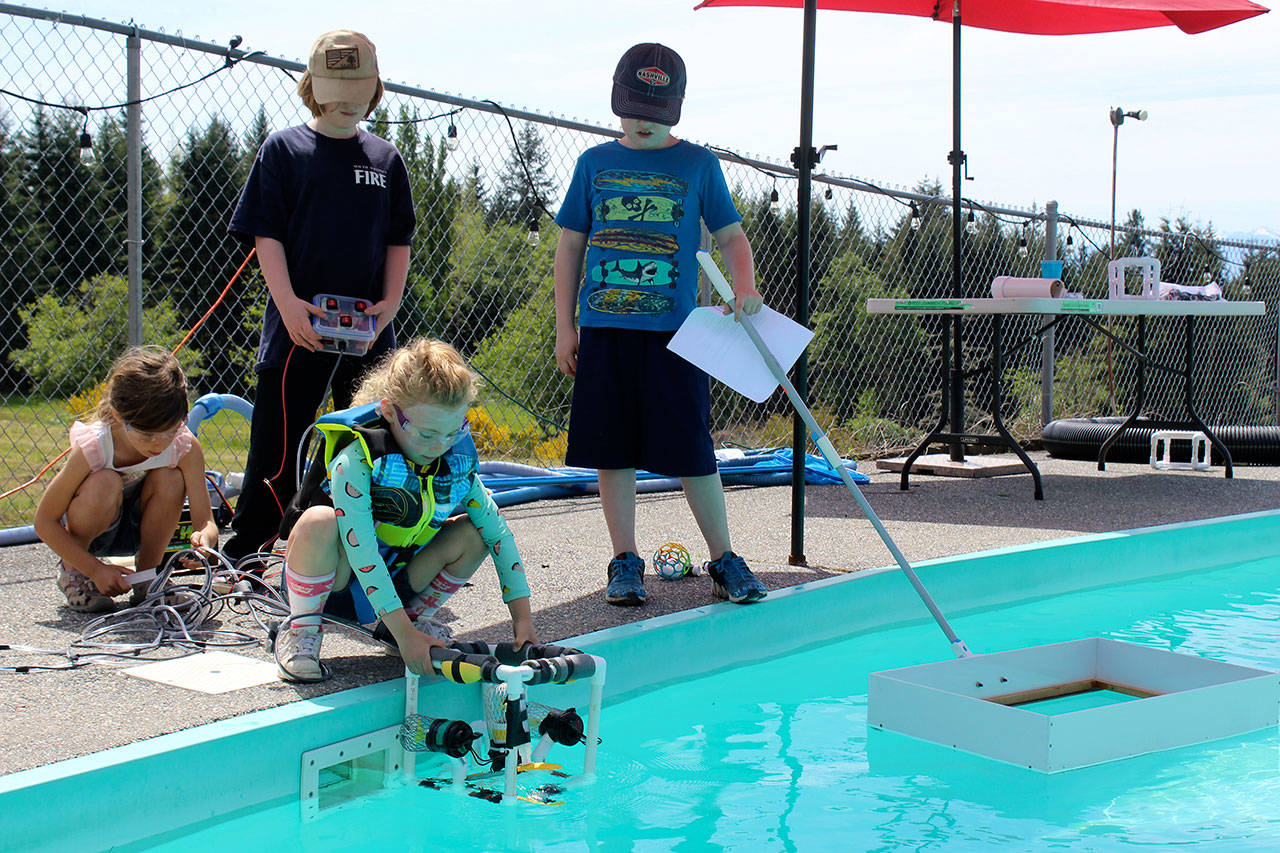Sun’s out, sky’s clear and it’s finally swim time on South Whidbey after a long, cold spring.
But at Thursday’s backyard pool gathering of some two dozen kids and teens with the Atlantis STEAM club, no one gets wet.
Only their underwater inventions known as ROVs, or remotely operated vehicles, take a splash into the blue pool.
Attached to a long tether, team members manipulate the device to pick up objects at the bottom of the pool and to deliver research tools, such as test tubes with water samples. A tiny camera on the front of the bot allows them to watch progress on a monitor from a table set up in the shade.
Ranging in age from 6 to 13, the club focuses on STEAM — science, technology, engineering, arts and mathematics — with an emphasis on inspiring girls and other underrepresented youth.
They are rehearsing a 15-minute demonstration they’ll be presenting Saturday at the Pacific Northwest Regional Challenge at Federal Way’s Weyerhaeuser King County Aquatic Center.
The competition also involves a 15-minute oral presentation where team members explain to judges how the bot was built, challenges that were overcome and potential applications for the device.
A team poster must also be designed.
Split up into teams based on their ever-expanding skills, only the most experienced group entered in the Ranger division is eligible to qualify for the MATE (short for marine advanced technology education) International ROV Competition, this year in Kingsport, Tenn.
Many Whidbey teams have traveled to competitions over the years, but this is the biggest group yet at 25 students, said mentor Ashley McConnaughey. The team is supported by business sponsors and assisted by numerous parents who volunteer their time and a few tips now and again.
“Adults only assist, they do not build anything,” said McConnaughey, a longtime mentor. “This is all student driven and they learn to keep trying. Engineering is all about failure.”
Six years ago, the Atlantis ROV Team won the regional competition and placed 11th in the international competition.
In 2014, they placed second in regionals and then conquered the world, taking first place at the Black Sea International ROV Competition in Romania.
One of those champions, Haley McConnaughey, is now a mentor for the Ranger team.
Team Ranger practiced separately from the other teams Thursday; frequent updates via text indicated troubles were afloat.
“The Rangers just found out the new bi-directional monitor controllers were cutting their power by half,” Ashley McConnaughey, reported to the other teams. “They are scrambling to fix it.”
Each team is given a list of missions for the bot to accomplish, usually based on themes, such as maintaining wildlife habitat, ensuring public safety and preserving history by locating items stuck on the bottom of a waterway.
This year’s challenge focuses on trout habitat in rivers, dam inspection and recovering a Civil War era cannon recently found in a Tennessee river.
“Our bot is made to complete as many challenges that we have been given,” said Spencer Jonas, one of seven members of Team Trident that named their bot Poseidon. “Too much buoyancy and it can’t keep going.”
Teammate Gabe Townsend explained in his oral report that bots can go where people cannot.
“A bot can carry out the cannon shells from the river in Tennessee,” he said. “They might still be live ammunition so it’s not safe for divers to retrieve.”
Parents seemed equally as excited about seeing the bots in action that their kids have toiled over since the fall.
“It’s not only the robotic techy part they learn,” said Beth Napoli, who has two daughters on the Atlantic club. “They learn teamwork and public speaking. It’s a great all around program.”
Jodie Wilson, mom to six-year-old Estrella Wilson, said her daughter loved learning how to solder, a skill needed to attach wires and various bot parts. “She learned about the solder iron and how to use wire cutters,” Wilson said. “It’s amazing to see your 6-year-old doing this.”
Nine-year-old Shaun Davon said brainstorming with his team members about what would or would not work was “really fun.”
“It was surprising how fast we came up with the design,” he said. “In fact, we were the first team to get it in the water.”



